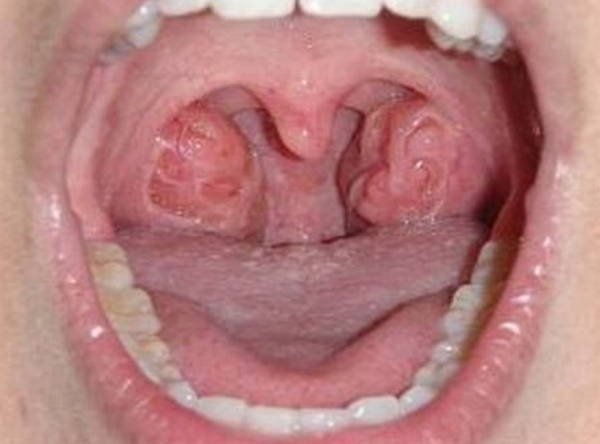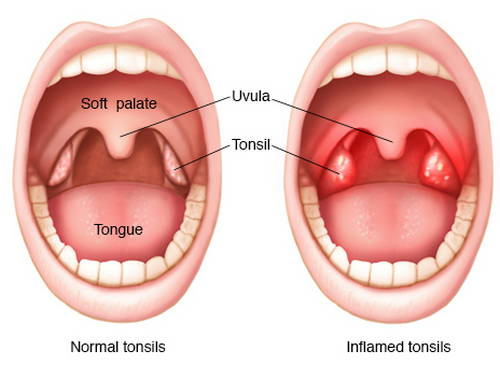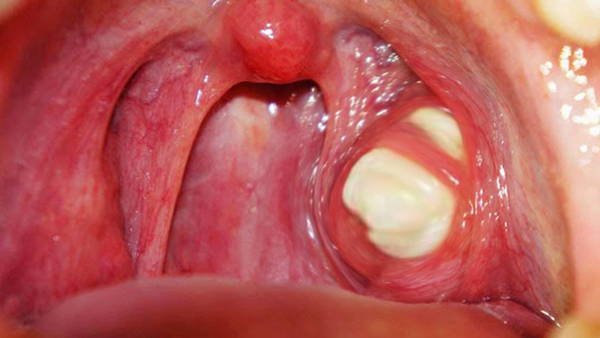Holes (Crypts) in Tonsils
Last reviewed by Dr. Raj MD on January 12th, 2022.
The tonsils are lymphoid tissues. The content of this tissue is covered by respiratory epithelium, which might cause crypts/holes.
The tonsils are oval in shape and located at the back of the throat. Their primary role is to shield the body from microbial infections. Because of the lymphoid tissue content, tonsil holes might develop.
Are holes in tonsils normal?
Anatomically speaking, tonsil crypts/holes are part of the human anatomy. They signal the immune system if there is an ongoing infection. In the presence of infection, the tonsils swell and the holes are blocked.
A large hole in tonsil can be a damping site for food particles, mucus, and other debris. If not dealt with right away, there is a possibility of blockage, which might harbor bacteria and increases the risk of developing infection and formation of tonsil stones.
The presence of tonsil stones is called tonsilloliths. Over time, it could lead to undesirable smell, which in turn leads to halitosis (bad breath). (1, 2, 3)

Image 1: Both tonsils are inflamed and have numerous craters.
Picture Source: treatmd.org
Why do I have craters in my tonsils?
What are the causes of holes in tonsils? The common causes of tonsil craters include the following:

Photo 2: A comparison image between normal tonsils and inflamed tonsils.
Picture Source: www.mayoclinic.org
Tonsillitis
The tonsils are severely inflamed, which is usually caused by a virus. Although, it could also be a result of bacterial infection. Tonsillitis commonly affects school-aged children. Signs and symptoms of tonsillitis are as follows:
- There are discolored patches on the tonsils (whitish to yellowish)
- The tonsils are swollen
- The lymph nodes are enlarged
- Fever
- Sore throat
- Pain when swallowing (dysphagia)
- Bad breath (halitosis) (4, 5)
Mononucleosis (kissing disease)
It is a highly contagious disease that is transmitted through saliva. Simple kissing can transmit the virus from one person to another. Hence, it is called kissing disease. It causes swelling of the tonsils leading to obstruction of the holes in the tonsils. Mononucleosis clinical manifestations include:
- Swollen throat
- Headache and fever
- Swelling of the spleen
- Presence of skin rash
- Fatigue/tiredness (4, 5)
Bad oral hygiene
If you are not going to observe good oral hygiene, there is a tendency that bacteria will accumulate in the oral cavity, which makes your mouth susceptible to infection. symptoms suggestive that you are not taking good care of your oral health include:
- Infected tonsils
- Build-up of plaque
- Bad breath
- Cavity formation (recurrent)
- Visible coating on the tongue (6)

Image 3: A close up view of the tonsil stones.
Picture Source: i.ytimg.com
Tonsil stones
The medical term for tonsil stones is tonsilloliths. It is caused by trapped debris in the tonsil holes, which in time could harden and become stones. As time passes by, the stones grow causing further blockage and infection in the holes in the tonsils.
Tonsils tones can go unnoticed until such time that the infection gets worst. You need to watch for the following symptoms:
- Bad breath (halitosis)
- Difficulty swallowing
- Persistent cough
- Ear pain
- Presence of yellowish to whitish debris on the tonsils
- Persistent sore throat (6, 7)
Do tonsil stones go away on its own? How do you get rid of tonsil stones?
Tonsil stones do not go away on their own. If you do not take measures to remove it, then it will be there forever, which makes you susceptible to various types of infection.
To help get rid of the tonsil stones, you need to consult your doctor. He will recommend oral care regimen that will eliminate and prevent tonsil stones.
Sedentary lifestyle
Lifestyle such as smoking is not directly related to the formation of holes in the tonsils. What it does though is it wears down the immune system making you susceptible to various types of infection. It could lead to the formation of tonsil stones, which could eventually cause large tonsil holes.
Cancer
Holes in the tonsils are linked with some types of oral cancer. Symptoms to watch out for are the following:
- Blood-stained saliva
- Persistent sore throat
- Unequal tonsils (one is larger than the other)
- Mouth and ear pain
- Bad breath (halitosis)
- Lump in the neck which causes pain when swallowing (6, 7, 8)
Treatment and Management
Maintain a good oral hygiene
It is a must to keep your mouth clean at all times. It will hasten the healing process and prevent further infection.
Saline water gargle
To significantly reduce the pain, inflammation, and discomfort, you should gargle saline water (lukewarm water with salt).
Mouthwash
Some brands of mouthwash can help reduce the spread of infection.
Live a healthy lifestyle
It is a must to stop doing things that can aggravate your health condition such as smoking or use of any types of tobacco products.
Treatment of the underlying cause
The underlying cause of holes in tonsils should be treated because that is the only way to address the problem permanently. These include the following:
- Mononucleosis – It is managed using hydration therapy and plenty of sleep and rest.
- Strep infection – It should be treated using antibiotics.
- Tonsil stones – It is best managed using saline water gargle and/or laser treatment.
- Oral cancer – It requires an extensive treatment approach such as radiotherapy, chemotherapy, and surgery.
Surgical removal of tonsil stones
If the tonsil stones are large or recurrent, the best approach is to have it surgically removed. It is done under local anesthesia. However, most doctors recommend removing the tonsils, which is done under general anesthesia.
Removing the tonsils is the most effective way of preventing tonsil stones and holes in the tonsils. The procedure is called tonsillectomy. The decision to surgically remove the tonsils depends on the overall condition of the patient and the doctor’s discretion. (8, 9, 10)
References:
- www.healthline.com/health/holes-in-tonsils
- www.healtreatcure.org/tonsils/holes-in-tonsils-white-spots-large-small-strep-throat-get-rid/
- medlicker.com/1281-holes-in-tonsils
- webmd.com/oral-health/guide/tonsil-stones-tonsilloliths-treatment-and-prevention#1
- wowremedies.com/holes-in-tonsils-causes-treatments/
- healthfully.com/cure-holes-tonsils-5158949.html
- howtocure.org/tonsils/holes-in-tonsils-causes-pus-collect-food-no-pain-strep-holes-behind-tonsils/
- treatmd.org/tonsils-holes/holes-in-tonsils-causes-white-chunks-normal-sore-throat-strep-how-to-get-rid/
- www.medhealthdaily.com/holes-in-tonsils/
- healthncare.info/holescrypts-tonsils-strep-throat-pictures-treatment/